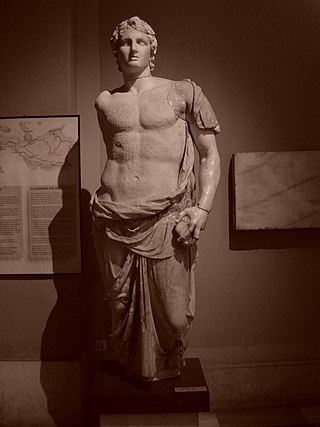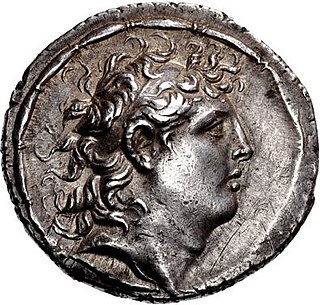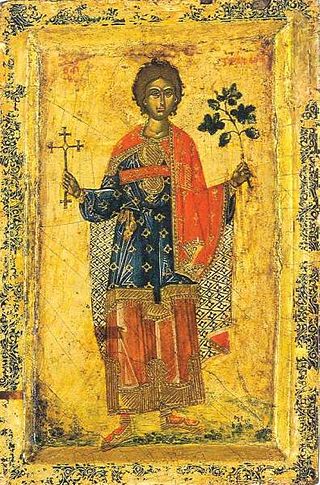See also
- All pages with titles containing Tryphon
- All pages with titles containing Trypho
- Trifon, Russian variant of the name
Tryphon, Triphon, or Trypho may refer to:

Alexander is a male name of Greek origin. The most prominent bearer of the name is Alexander the Great, the king of the Ancient Greek kingdom of Macedonia who created one of the largest empires in ancient history.
Andronicus or Andronikos is a classical Greek name. The name has the sense of "male victor, warrior". Its female counterpart is Andronikè (Ἀνδρονίκη). Notable bearers of the name include:
Porphyry may refer to:
Didymus may refer to:
Apollodorus was a popular name in ancient Greece. It is the masculine gender of a noun compounded from Apollo, the deity, and doron, "gift"; that is, "Gift of Apollo." It may refer to:

Diodotus Tryphon, nicknamed "The Magnificent" was a Greek king of the Seleucid Empire. Initially an official under King Alexander I Balas, he led a revolt against Alexander's successor Demetrius II Nicator in 144 BC. He rapidly gained control of most of Syria and the Levant. At first, he acted as regent and tutor for Alexander's infant son Antiochus VI Dionysus, but after the death of his charge in 142/141 BC, Diodotus declared himself king. He took the royal name Tryphon Autocrator and distanced himself from the Seleucid dynasty. For a period between 139 and 138, he was the sole ruler of the Seleucid empire. However, in 138 BC Demetrius II's brother Antiochus VII Sidetes invaded Syria and brought his rule to an end.
The name Dionysius was common in classical and post-classical times. Etymologically it is a nominalized adjective formed with a -ios suffix from the stem Dionys- of the name of the Greek god, Dionysus, parallel to Apollon-ios from Apollon, with meanings of Dionysos' and Apollo's, etc. The exact beliefs attendant on the original assignment of such names remain unknown.
Apollonius is a masculine given name which may refer to:
Callistratus or Kalistrat, Kallistratos is a given name of Greek origin. It may refer to:
Asclepiades may refer to a number of different people:
Tryphon or Trypho was a Greek grammarian who lived and worked in Alexandria. He was a contemporary of Didymus Chalcenterus.
Aristarchus may refer to:
Ptolemy was an Alexandrian mathematician, astronomer, geographer and astrologer.

Saint Tryphon of Campsada was a 3rd-century Christian saint. He is venerated by the Roman Catholic and Eastern Orthodox churches as a great martyr and holy unmercenary.
Demetrius may be a given name.

The Dialogue with Trypho, along with the First and Second Apologies, is a second-century Christian apologetic text, usually agreed to be dated in between AD 155-160. It is seen as documenting the attempts by theologian Justin Martyr to show that Christianity is the new law for all men, and to prove from Scripture that Jesus is the Messiah.
HaKohen is a Jewish given name and surname. Notable people with the name include:
Syrus is a character in Greek mythology after whom Syria and the Syrians are named.
Trifon or Trifón is a given name derived from the Ancient Greek: Τρύφων, romanized: Tryphon, lit. 'one who lives in luxury'. An archaic transliteration from Greek is Trufon. It is used by Russians and other peoples of East Orthodox denomination. There is also a surname variant of the word.

Trypho was a Christian theologian and Bible scholar of the 3rd century. He was a pupil of Origen.